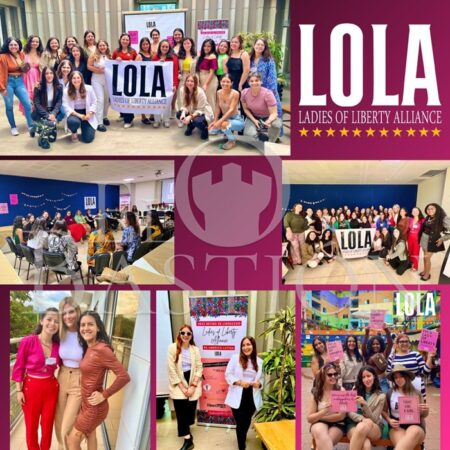LOLA is Reclaiming Liberal Feminism
LOLA’s initiatives and efforts were covered in the media. Below you can read the English version of the original article in Spanish, from Colombian newspaper “El Bastion”.
It covers how LOLA is reclaiming liberal feminism in Latin America, as opposed to radical (marxist) feminism that is common today. We hope you enjoy reading it as much as we did!

Original article written by Cristan Toro.
Surely, when you hear the word “feminism”, you immediately associate it with an angry and radicalized mob of women. But how would you react if I told you that, initially, feminism was strongly linked to classical liberalism and free-market capitalism, the allies that lead to the advancement of women? Or, how would you look at me if I told you that the problem of ‘machismo’, as today’s radical feminism try to persuade you, has nothing to do with free market capitalism at all? And also, are the words “misogyny”, “machismo” (again) and “patriarchy” terms that, despite being related to each other, are not synonymous? On the other hand, if there are still so many situations in all corners of the planet that continue to ignore women and do not make them visible as what they really are: an individual beyond their sex and their tastes or preferences, is there a possibility and a need for a feminism inherent to classical liberalism, or libertarianism, today? Is there a possibility and need for a liberal feminism (libertarian feminism), so to speak? If you want to know, I invite you to continue reading this column.
Before getting into the matter, I want to make the relationship between classical liberalism and feminism clear, starting from their current meanings and their original conception. First of all, (classical) liberalism, although it is a polysemic term, can be explained, in general, as a sociopolitical philosophy that defends the inalienable right to freedom of all individuals as an inescapable precept so that all of them can pursue their own projects of life, and their own happiness, coexisting peacefully. In this sense, liberalism is not only a firm and favorable philosophy for individual freedom, but also initially egalitarian, since each and every human being possesses the same fundamental right to freedom. The English philosopher Herbert Spencer summed it up wonderfully in his well-known law of equal freedom, thus: “Every human being has the freedom to do whatever he wants, as long as he does not violate the equal freedom of others.”
Here is the reason why liberalism, both classical and libertarian to be more specific, is entirely compatible with the first historical wave of feminist or suffragist movements. The first feminism, or original feminism, ensured full legal equality between men and women. That first feminism waved a genuinely liberal flag, as the great Friedrich Hayek emphasized at the time: “The fight for formal equality and against all discrimination based on social origin, nationality, race, creed, sex, among others, remains one of the most important features of the liberal tradition. Clearly, without legal equality, or to be more explicit, without equality before the law, neither classical liberalism nor libertarian liberalism can exist, since legal inequality or before the law is equivalent to imposing the servitude of some individuals in privilege of others, clarifying that this equality before the law has nothing to do with social equality; The fact that each person is recognized for this does not imply that they will use that area in the same way and with the same results as their peers, since equality before the law spontaneously leads to an evident social inequality as a result of the diversity of tastes and preferences, and also of capacities.
At a time when women are the new subject of the most frantic revolutions, but simultaneously, the most inspiring, feminism that claims legal equality between men and women, is consistent with classical liberalism and libertarian liberalism, in the words of Juan Ramón Rallo. Liberal feminism promotes a change in those social structures that are considerably oppressive towards women or that have arisen under state coercion, refusing, sharply, the use of violent means to do so. Anyone who is concerned with the vindication of the fundamental rights of women as individuals, or with the present reparation for past injustices perpetrated against them, can find a place within classical liberalism and libertarian liberalism, as long as they refuse to transgress the freedoms of other innocent men and women. The questions that come now are: How to materialize this possibility and necessity of this liberal feminism? And does anyone already do it? The how, responding to the first, is something that is in permanent construction, and that is molded according to the changing circumstances in the whirlwind of new times. The answer to the second, is a resounding YES; That yes takes shape under the direction of LOLA: Ladies of Liberty Alliance, a global organization whose mission is to educate and empower women who move within classical and libertarian liberalism.
LOLA is a network of classical or libertarian liberal women leaders who, through their careers and/or personal efforts, are dedicated to spreading the ideas of economic and individual freedom, with the purpose of achieving a much freer society; Participation in the organization is open to any woman who identifies with or wishes to explore liberal ideas, whose passage is free and self-defined. LOLA was born in 2009 as a non-profit organization that addresses the scarcity of women in the freedom movement, with the intention of encouraging and supporting women to remain committed to liberal philosophy, promote freedom to new faces and elevate your work through leadership and training opportunities; The network remains active in the form of LOLA’s local Social Chapters (LOLA Social Chapters).
Local LOLA Social Chapters are exclusively women-led groups located in cities around the world, where, armed with their affinity for the ideas of freedom, they can come together to share their passion for them, establishing a strong community through relationship building, for the sake of empowering each other to be active members of the freedom movement.
LOLA Chapters also aim to educate new audiences, expanding the network of women, regardless of their age or other factors beyond their control.
LOLA Social Chapters events adopt the type of format that best suits the unique needs of each city, including policy-based discussions, self-defense classes, featuring local speakers/teachers/leaders, discussions on local issues, projection of films and documentaries, and shared meals.
The social elements of these meetings allow attendees to connect and build community in order to reach new people with the ideas of freedom. LOLA is in more than 31 countries, with local Social Chapters in more than 71 cities and with a network made up of more than three thousand five hundred (3,500) women throughout the globe.
In fact, the Social Chapter of LOLA in my city: Medellín, hosted women from different Latin American countries, from October 7 -9, 2022, as part of its Leadership Trainings.The 2022 LOLA Leadership Retreat in Latin America, in which personalities such as Antonella Marty (Argentina), María de Lima Moreno (Uruguay) and María Amaré (Venezuela) participated in. The event allowed, among many of the benefits produced at the retreat, the consolidation of LOLA as an allied and permanent organization of our media: El Bastión and Al Poniente (the Communiqué will be formally issued soon, both in Spanish and English), and the incorporation into their ranks of two (2) of its members, Co-founder and National Director, correspondingly, of the versions of LOLA in their respective countries: Sara Urquizu from Bolivia and Catalina Saire from Chile, with a view to more than they form an integral part of the organizations mentioned.
Although the event, due to the nature of LOLA, was only for women, hours before the opening of the event, I was allowed to do some interviews with several of the girls who were present as speakers and attendees; I was also allowed to attend Antonella Marty’s presentation: Impacting Latin America, offered on Saturday, October 8. Each and every one of the girls interviewed, I found fascinating for what they do and for the vision they have of our reality and the increasingly urgent need for more people to know what classical liberalism and libertarian liberalism consist of, coupled with original (or liberal) feminism as a way to achieve this. I could write a column perfectly for each interview, given that each girl constitutes and represents a unique world: they spectacularly expose what individualism is, that one, so annihilated by all forms of collectivism today; However, the intention of this note is not to get to know them in depth –we leave this for later installments, or rather, we leave it so that their notable actions speak for themselves–, but to get closer to their resumes, and to their invaluable and ongoing work as liberal feminists. With all of them, I validate that liberal feminism still has a lot to accomplish!


